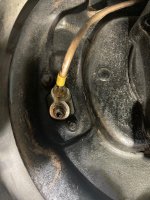I know four-wheel drum brake issues have been beaten to death on the forum, but my wife is ready to commit me to the psych ward. Trust me, I have read every brake thread in the forum and have tried all of the suggestions: new MC isolated, system pressurized-no leaks, power bleeding, two person bleeding, wheel cylinders compressed, every pipe and hose connection opened and bled, steady pins adjusted etc, etc, etc.
Pedal is extremely low, almost to the floor. It is firm, but not real hard. Pumping the pedal does cause a slight rise in height.
What other possible mechanical issues could be causing that much fluid movement? Appreciate any additional suggestions.
1959 BN6 - MC bore .750 -1” wheel cylinders.
Alan
Pedal is extremely low, almost to the floor. It is firm, but not real hard. Pumping the pedal does cause a slight rise in height.
What other possible mechanical issues could be causing that much fluid movement? Appreciate any additional suggestions.
1959 BN6 - MC bore .750 -1” wheel cylinders.
Alan

 Hey Guest!
Hey Guest!

 smilie in place of the real @
smilie in place of the real @
 Pretty Please - add it to our Events forum(s) and add to the calendar! >>
Pretty Please - add it to our Events forum(s) and add to the calendar! >> 
